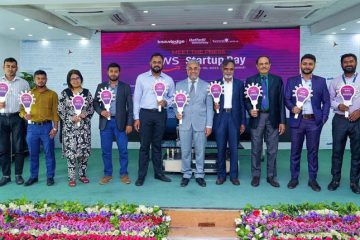Orascom Telecom Group CEO reflects his thoughts on Bangladesh market
The view from Orascom Telecom Holding’s group CEO’s office is breathtaking. You can see the mighty river Nile flowing right through the Egyptian capital Cairo. You can tell why they call this longest river in the world the lifeline of the country and watch the city expand by its shores.
Just like the view from his office, Ahmed Abou Doma, Group CEO of OTH, has a bird’s eye view of the Bangladesh telecom market as he spent over three years in the country as CEO of Banglalink.
Banglalink, the second largest telecom operator of the country, looks forward to a prospective year in 2012, as their parent company OTH has allocated a good amount of money for the growing Bangladesh market recently.
Doma disclosed this during an informal session at the company’s headquarters in Cairo on October 19. He however did not reveal the amount but shared his thoughts.
“Banglalink is very well-positioned and will continue to become an aggressive marketing company. With an underprivileged market like this, with the brand equity we have as Banglalink and as especially the youth segment of the population loves us, so sky is the limit for us,” he said.
“We had a business review meeting for Bangladesh operations yesterday and we have allocated quite a good amount of investment for the upcoming year, because we are committed to development of the market, and that is something that we have put in numbers. So we are looking for a good year in 2012,” he added.
Doma voiced his thoughts on the telecom industry in Bangladesh. He said the level of development of the sector is not at par with the size of the country and it should be much better.
“If you are talking about a country like Central African Republic with a penetration of 50 percent, the overall development of the country is low anyways, so that comes with it. But that is not the case for Bangladesh: you have a relatively a good level of literacy, everything looks much better until you come to the telecom sector, and now you are comparing yourself to much lower countries in scale. You deserve better in that sector.”
He also informed that a delegation from the Bangladesh’s telecom ministry would visit Egypt at the invitation of the Egyptian counterpart.
“We have pushed for it so there is an exchange of ideas between the Egyptian and Bangladeshi counterpart because I feel that there are things that have been done in Egypt can exactly be replicated in Bangladesh,” he said.
“Representatives from some outsourcing call centres will be a part of the delegation to see how we are running the business, and this is a great opportunity for Bangladesh,” he said.
They will also visit a “Smart Village”, where most of the technology companies are located.
“Bangladesh could plan for building their own smart village someday to become a hub for attracting technology for the region,” Doma mentioned.
A “Smart Village” is a way to concentrate technology companies into one place to make synergies between them and with the regulator. It is a way to attract foreign direct investment into the technology sector. A similar concept exists in Hyderabad, India, which is called the “Cyber City”.
Doma said Bangladesh should be more aggressive in implementing power projects. “One thing that comes back to me every time I look at the business in Bangladesh is that you have to be more aggressive in terms of power generating projects.”
“The power problem in Bangladesh is not going to be solved soon. The present government has taken some initiatives, but unfortunately you will see the outcome a few years later because the nature of the power plants is not something that you turn it on and the next day it works. It takes a lot of time and efforts.”
The OTH chief said the government needs to invest more on infrastructure projects. The telecom sector has quite a regulated market in Bangladesh.
“What you need is to encourage further investments from companies like us, but it all depends on the regulatory environment. Regulations make an investor to think whether he will put in money or not into the country. The development of the sector will depend on regulations,” he added.
Wind Telecom, the parent company of OTH, merged with Vimpelcom Ltd, one of the world’s largest groups of integrated telecommunications services, in April this year, creating the world’s sixth largest mobile telecommunications service provider in terms of subscribers, with operations in 19 countries serving 193 million customers.
Banglalink has crossed the milestone of 20 million subscriber mark in January this year and ended the first half of the year at 20.2 million, a 4.5 percent increase from EOY 2010 and 25.5 percent increase from same the period last year.
Banglalink’s revenue grew to US$ 253 million in the first half of 2011, an increase of nearly 19 percent compared to the same period last year. The mobile company achieved an EBITDA of $ 99 million in H1 this year, representing a 35 percent increase compared to the same period last year.
-With The Daily Star input











